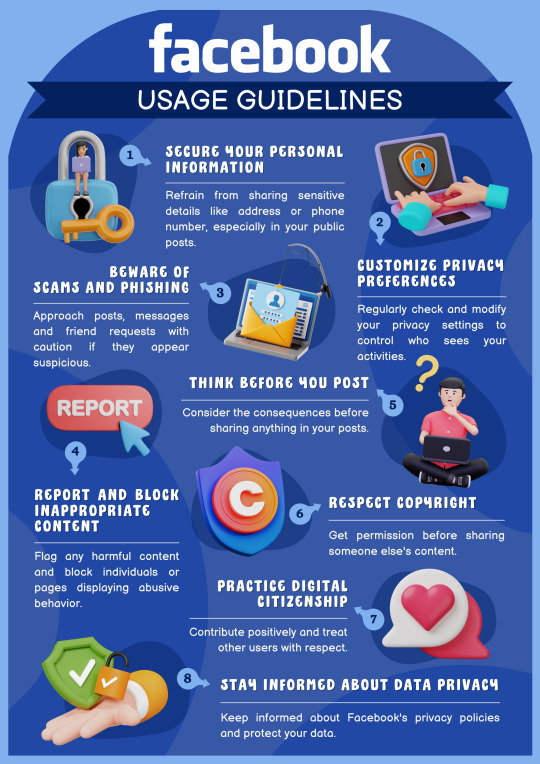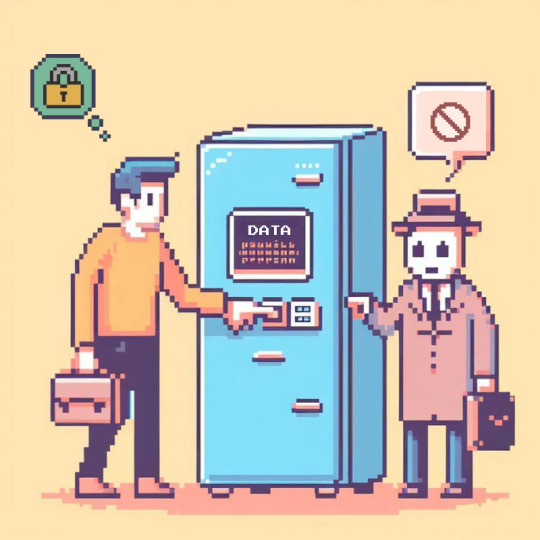This digital journal delves into data privacy and security.
Don't wanna be here? Send us removal request.
Text
Beyond the Manual: Data Privacy in Academia

Navigating the complexities of data privacy in a large academic institution is no simple task. Today's Data Privacy and Security class provided an in-depth look at our university's official Data Privacy Manual as preparation for our final learning evidence for the course - creating our own data privacy manual. This comprehensive document outlines the policies and protocols instituted to safeguard the personal data and information of students, employees, and other stakeholders across the university system.
As we reviewed the manual, I gained a clearer understanding of just how much sensitive personal data the university necessarily collects and processes in carrying out its core functions. Everything from student admission applications and academic records, to employee records and payroll data, to visitor logs and CCTV footage falls under the scope of personal data that requires proper protection measures. The manual emphasizes key data privacy principles like transparency, legitimate purpose, and proportionality, which must be adhered to in all activities involving personal data collection and processing. Individuals should be made aware of what data will be gathered, why it is needed, how it will be used, and only the minimum necessary amount of data for that purpose should be retained.
While the depth and thoroughness of the manual is admirable, our class discussion raised concerns about whether the university is genuinely implementing and abiding by these policies uniformly across all units and information systems. In a previous discussion, our professor mentioned that our very own university has fallen short of complying with certain pillars of the National Privacy Commission's compliance framework for data privacy. This struck me as contradictory, given that our university has been awarded the Privacy Commission's Seal and Certificate of Registration, which is supposed to be an attestation that an organization is diligently complying with data privacy laws and regulations. How were we able to obtain that certification if gaps still exist in our privacy practices and framework execution?
It seems ironically misaligned for the university to have that prominent recognition from the regulatory authority overseeing data privacy in the Philippines, when we may not have all of our privacy measures entirely in order from their perspective. The seal and certificate should manifest an organization's earnest efforts toward Data Privacy Act compliance.
Moving forward, I hope our class could have taken a deeper audit look into how the university's actual data handling activities and safeguards measure up to what is prescribed in this manual. While having such a policy document is a good start, it is only meaningful if the procedures and controls are robustly operationalized across all data processing instances in a day-to-day practice. Understanding these policies is important, but witnessing their consistent implementation through analysis of real-world test cases is crucial to identifying any gaps and aiding compliance. I'm particularly interested in examining recent data breach or security incident response cases to see how they were managed compared to the protocols laid out here. These types of scenarios will be invaluable learning experiences as I prepare for a career ensuring data privacy and security in my future roles.
3 notes
·
View notes
Text
Facebook Policy Playbook

Preserving digital privacy and understanding the digital landscape of popular platforms like Facebook has become essential for responsible virtual citizens and tech-aware individuals. Today's discussion on Facebook's data collection practices was incredibly eye-opening. We watched an informative video that shed light on the various types of data that the platform gathers - explicit data we provide, metadata about our activity, information from third-party sources, and even off-Facebook online activity through tracking pixels and plugins on other websites.
The video provided some wise advice on limiting the platform's access to our personal data by regularly reviewing and tightening privacy settings, being cautious about sharing sensitive information publicly, and being wary of scams and phishing attempts aimed at extracting login credentials. Ultimately, the professor rightly emphasized that "privacy only comes to those who work for it" and that we must remain proactive about safeguarding our digital footprints.
I applied this learning in the creation of my social media policy, a learning evidence output that is a deliverable for this course. Mine so happens to be Facebook, and the content summarized the best practices for responsible platform use. Developing these guidelines forced me to think critically about online privacy, security, and ethical conduct.

Personally, crafting a balanced policy that protected user privacy while still enabling the core social functionality of Facebook was quite challenging. Eventually, I decided to aim to empower users with knowledge and tools to make well-informed choices that align with their personal privacy preferences. I advocated for clear, straightforward language and a fun visual layout to maximize accessibility and engagement.
Notably, I stressed the importance of the platform being transparent about its data collection practices - an issue highlighted in today's lesson that currently needs to be addressed. I also appropriately tackled on the definition of digital citizenship and respectful conduct without being overly restrictive.
Creating these guidelines hands-on brought the risks and nuances of the digital world into sharp focus and solidified my learnings from this session. I now have a deeper appreciation for thoughtfully upholding ethics as a virtual citizen and potential future tech developer. As the line between our digital and tangible realities continues blurring, thoughtfully navigating through these risks and nuances is essential for protecting our privacy and rights moving forward.
2 notes
·
View notes
Text
Privacy Pepperoni: Lessons from ‘Ordering a Pizza in the Future’
I recently had the opportunity to watch a short film titled "Ordering a Pizza in the Future" during a session for my Data Privacy and Security course. This media depicted the concept of information creep and how seemingly harmless data collection can escalate into a detailed profile used for targeted advertising, or even manipulating behavior. While the film humorously portrayed the challenges of ordering a pizza in a futuristic setting, it also provided me valuable insights into data privacy and security concerns that are faced today.

The film is not just a science fiction. Online retailers are already using our browsing history and purchase behaviors to suggest targeted ads, a practice that eerily resembles to the film's personalized pizza recommendations. The bigger concern lies in data security. The film emphasizes how vulnerable customer data would be if they're not properly secured, as this may lead to data breaches.
The short film then elevates the gravity of the scenario by incorporating sensitive data like medical records. This raises real-world concerns about regulatory compliance and unauthorized access to sensitive healthcare information. To add, the film explores the potential for algorithm manipulation. We see the system suggesting a "healthier" pizza option based on the customer's medical data, but also subtly inflating prices based on the same information. This raises concerns about fairness and equal access to services in a world that is driven by AI algorithms.
As one of the future information security professionals, the film emphasizes my responsibility in this evolving landscape. We must take part in the development of secure systems that protect user data from unauthorized access. Implementing robust encryption methods and advocating for strong data privacy regulations are crucial. These regulations should let the users have full control over their data, allowing them to opt-out of data collection or request data deletion as they see fit.
However, security may just be a piece of the puzzle. The short film serves as a springboard for a more proactive approach. There certainly is a way that we can strive for a future where technology serves us without infringing on our privacy and we can do that by exploring privacy-enhancing technologies like blockchain that gives users greater control over their digital footprint. In this way, we may be able to shield user data while allowing them for data analysis.
Perhaps the most crucial element is fostering a culture of data literacy. Educating users about their rights and offering user-friendly interfaces that clearly explain data collection practices are essential steps to ensuring we don't get to live our lives in a dystopian nightmare. By acknowledging the potential dangers shown in the "Ordering a Pizza in the Future" short film and actively working towards solutions, we can shape a future where technological progress goes hand-in-hand with robust data privacy and security. After all, who wants their pizza order to come with a side of identity theft?
2 notes
·
View notes
Text
Convenience, Confidentiality, Conundrum

Bad things happen when data gets into the wrong hands. The news about a certain celebrity couple's private affairs has been buzzing across various platforms, and it has created enough noise for it to be brought up in the introduction to one of our discussions with our course instructor, because of how it's such a great example of what happens when a breach in data privacy takes place. We now live in the digital age where every aspect of our lives, from personal interactions to financial transactions, leaves a trail of data. I've learned that as this influx of information presents its opportunity, it also gives challenges concerning privacy and security.
In my perspective as someone who owns a printer at home and offers basic printing and copier services for people in her neighborhood, I've observed that my customers appear indifferent about the privacy of their data. They're trusting enough to lend their flash drive for me to print or create a copy of their documents, even the ones that contain classified information like birth certificates, and valid IDs. There are also customers that do not have a hint of reluctance in them in sending their document files to my email, for them to be printed. While it's convenient for customers to rely on local printing services like mine, their apathetic attitude towards the privacy of their data is concerning.
Entrusting sensitive documents containing personal information such as birth certificates and valid IDs without ensuring proper handling puts them at risk of data breaches. I, as the service provider, give high regard to the privacy and security of my customers' data. However, it should be an essential for customers to be more mindful of the potential risks involved in sharing sensitive information and to take proactive steps to protect it. In addition to the practices of customers, it's also important for service providers like me to implement data retention policies, which I hadn't consciously done until I've learned about it in this module's discussion, where I became more aware of proper data retention practices.
The imparted knowledge from this session have been an eye-opener for me, and it is evident in the way I have realized the application of these knowledge in my very own personal life. I have learned that in an era wherein digital footprints are omnipresent, it's crucial for both individuals and businesses to strike a balance between convenience and confidentiality when it comes to data privacy. On one hand, convenience is undeniably a driving force in our digital age. The ease of sharing information, accessing services, and conducting transactions online has revolutionized the way we live and work. From online shopping to social media interactions, convenience often takes precedence over concerns about privacy. However, this convenience should not come at the expense of confidentiality. As highlighted in the example of the celebrity couple's privacy breach, the consequences of mishandling sensitive data can be far-reaching and devastating. Whether it's personal documents like birth certificates and IDs or financial information, the stakes are high when it comes to safeguarding privacy. It is crucial for individuals to be vigilant about who they entrust their data to and the measures taken to protect it. Likewise, businesses must prioritize data security and implement robust protocols to prevent unauthorized access and breaches.
To conclude this journal entry, I believe that the dilemma that we face in the digital age requires a refined approach that considers both convenience and confidentiality. We need to be mindful of the risks associated with sharing sensitive data and take proactive steps to protect our privacy. By navigating this delicate balance, we can harness the benefits of technology while mitigating the risks of privacy and security breaches.
2 notes
·
View notes
Text
Chronicles of a Chronically Online Soul

'Chronically online'—a phrase that I, reluctantly, can describe myself. I have been exposing myself to the world of the Internet since I became computer-literate in my early childhood, and I possess as many social media accounts as there are days in a month. Though, as I grew fascinated with information security in high school, I have since long been trying to clean up the mess I made during my younger years. But that doesn't equate I stopped spending so much time online; let's say I just toned down how much I am visible on the surface of the Internet— or so I thought I did.
I am a homebody, and I think I wouldn't be one if I didn't prefer buying my stuff online to getting it from physical stores. My most recent online transaction was when I bought a second-hand electronic commodity that someone posted in a forum. As proof of their credibility, the product seller, the previous owner of the item I bought, sent me a picture of their government-issued identification card, and some other personal details. At the time, I really was just reassured that I was not about to get scammed, and sure enough, I wasn't. But what if it doesn't end there?
In the first lesson of my Data Privacy and Security class, discussions have been made pertaining to unauthorized disclosure of sensitive information that may potentially compromise security. To say that my entire online life flashed before my eyes would be an understatement. I, then, was reminded of the recent purchase I mentioned in the previous paragraph. The class exchanges made me look into a different perspective. I started to question the necessity and potential risks associated with the seller sharing such sensitive information. While it served its purpose in that particular transaction, sharing government-issued identification and personal details with strangers online could pose privacy and security risks. Although I am very certain that I wouldn't break their trust and disclose the information they entrusted to me, the seller may not have considered the long-term implications of sharing such valuable information or the possibility of it being misused. Who's to say I can't get hacked and that information makes its way out of my inbox?
A question was addressed to us by our instructor, "Are you for sale?" Thinking about all the measures I did to carefully curate my social media persona, and how most of the information I gave out weren't irrevocable. The reality of my personal data being bought and sold remains unchanged. Despite my attempts to mitigate the impact of my earlier online activities, the data trail I've left behind continues to exist and may still be accessible to third parties without my knowledge or consent.
Now that I have become more aware of this persistent concept that is my digital footprint and the potential commodification of my personal data, I am motivated to further reassess my online habits and take proactive steps to protect my privacy and security as a chronically online individual. I will continuously educate myself on data privacy practices to navigate the cyber landscape more safely, as this just starts here.
4 notes
·
View notes
Text
Foreword
Hey there, welcome to ‘Server Room Memoirs'—my cozy corner of the internet where we dive deep into the world of data privacy and security. In this digital age, protecting our online selves is more important than ever. Join me on a journey filled with personal reflections aimed at fortifying our digital fortresses and navigating the online realm with confidence. Let’s start this adventure together, and let’s make sure our digital identity stays safe and sound.
5 notes
·
View notes